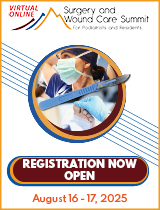|
|
|

|
Search
11/25/2015 Christopher Japour, DPM
Resident Documentation and Coding Survival Skills
In the past, the educational focus of medical and
residency training has involved training doctors
to be medically prepared. However, the
increasingly complex regulations that direct
clinical care have necessitated the
incorporation of the educational component of
resident training to both business and practice
management that involve all facets of medical
care.(1) There appears to be a training
deficiency with combined medical documentation
and coding beginning early on with medical
students, interns and leading on to residents
who many times are often at teaching hospitals.
(2)
There are many reasons to formally teach
documenting and coding principles during medical
training because an accurate legible medical
record is important to communicate patient care
also for utilization review, research and the
assessment of care by third-party payers. Hence,
correct documentation and coding allows for
timely billing and payment for services.(3) This
is especially of concern because of the
financially difficult times we are faced with
daily. Furthermore, poor medical records and or
poor coding is considered misrepresentation of
the medical record and threatens its
credibility and hence can be construed as
fraud. (4,5)
So, how can we best prepare our podiatry students
and PMSR residents to survive this ever
evolving healthcare environment , aside from
their basic podiatry knowledge set as well as
their residency MAV training requirements?
As simple as it may seem, and assuming a
reasonable medical/surgical knowledge set, we
should prepare them with the basics of SOAP
documentation from day one of their medical
student and residency training. The complete
S.O.A.P. note has subjective (S), objective (O) ,
assessment (A) and plan(P). Each component is
dependent or cross referenced with each other.
Simply each complaint mentioned in the body of
the subjective must be referenced in the
objective and stated in the assessment and plan.
Failure to do so can potentially spell disaster
for reimbursement and or medical legal issues.
The art of documentation of patient care through
the SOAP format and translating the note
information to correspond to ICD-10 diagnosis
codes should be embedded in the daily activity of
any rotation and strengthened by repetition. The
art of accurate documentation will provide our
new doctors with the much needed survival skill
set.
Documenting and coding correctly and accurately
is a learned skill, so let's be persistent with
teaching these necessary skill sets and hopefully
at the end of their 36 months of training
they will be knowledgeable to survive and
perhaps teach us some new tricks. Make use of the
APMA Coding resource Center as well as the many
other opportunities to attend webinars or
seminars.
The success of coding and documentation
program that we have developed and implemented
with our residents rely on continued daily
feedback from coders and doctors to reinforce
proper documentation and promote effective
healthcare delivery.
Finally, never let an opportunity pass to teach
these skill sets. In the words of Renato
Giorgini, DPM, "The written word , the spoken
word, the understood word and the implied word
must all be the same.”
References
1) Williford LE, Ling FW, Summit RL Jr, Stovall
TG. Practice management in obstetrics and
gynecology residency curriculum. Obstet. Gynecol.
94(3): 476-479,1999.
2) Koempel JA. Residency education, billing
practices and compliance issues. Pediatrics.
110(5):1031, 2002.
3) Stevermer JJ, Stiffman MN. The effect of the
teaching physician rule on residency education.
Family Med. 33(2): 104-110, 2001.
4) Dresselhaus TR, Luck J, Peabody JW. The
ethical problem of false positives: a prospective
evaluation of physician reporting in the medical
record. J Med Ethics. 28(5):291-294., 2002.
5) Leonardo JA. Health care fraud: a critical
challenge. Manag Care Q. 4(1):67-79, 1966.
Biography: Dr. Japour is Chief of Podiatry at
the Danville VAMC, Danville Illinois; Clinical
Faculty Member at Scholl School Of Podiatry.
There are no more messages in this thread.
|
| |

|
|







